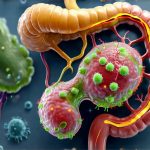The intricate ecosystem residing within our digestive tract – the gut microbiota – plays an astonishing role in overall health, extending far beyond digestion. This community of trillions of microorganisms, including bacteria, fungi, viruses, and archaea, influences immunity, mental well-being, nutrient absorption, and even chronic disease risk. Maintaining a balanced and diverse gut microbiome is therefore crucial for optimal functioning. However, modern lifestyles often present challenges to this delicate balance, with factors like diet, stress, and medication significantly impacting microbial composition. Two common disruptors – alcohol consumption, nonsteroidal anti-inflammatory drugs (NSAIDs), and other painkillers – can exert particularly detrimental effects on the gut microbiota, leading to dysbiosis (an imbalance in the gut microbiome) and potentially compromising health.
Understanding how these substances affect the gut is the first step towards mitigating their impact. Alcohol, even in moderate amounts, can alter microbial permeability, increasing ‘leakiness’ of the gut lining and allowing bacterial products to enter the bloodstream, triggering inflammation. NSAIDs and many painkillers aren’t simply inert compounds; they directly interact with the gut environment, reducing protective mucus layers and impacting microbial diversity. This disruption doesn’t just affect digestion – it has far-reaching consequences for systemic health. The good news is that targeted interventions can help restore and support a healthier gut microbiome after exposure to these common stressors, promoting resilience and minimizing negative effects. If you’re struggling with ongoing issues, understanding functional or structural differences can be a helpful starting point.
Alcohol’s Impact on the Gut Microbiota
Alcohol consumption profoundly impacts the gut microbiota in several ways, extending beyond acute disruptions caused by binge drinking. Even moderate, consistent alcohol intake can shift microbial composition over time. Specifically, alcohol tends to decrease the abundance of beneficial bacteria like Lactobacillus and Bifidobacterium, known for their role in maintaining gut barrier integrity and producing short-chain fatty acids (SCFAs) – vital metabolites that nourish the gut lining and support immune function. Simultaneously, it can increase populations of potentially harmful bacteria like Veillonella and certain strains of E. coli. This imbalance contributes to increased intestinal permeability, often referred to as “leaky gut.”
This increased permeability allows bacterial components, such as lipopolysaccharide (LPS) from Gram-negative bacteria, to cross the gut barrier and enter the bloodstream. This triggers an immune response, leading to systemic inflammation – a key factor in many chronic diseases. Furthermore, alcohol metabolism itself generates acetaldehyde, a toxic byproduct that can damage the gut lining and further exacerbate dysbiosis. The consequences aren’t limited to the gut; this inflammatory cascade can impact liver function (contributing to alcoholic liver disease), brain health, and immune regulation.
Chronic alcohol use is linked to alterations in gut microbial diversity – a hallmark of a healthy microbiome. Reduced diversity makes the gut more vulnerable to further disruptions and less resilient in the face of stress. Restoring gut health after alcohol exposure involves not only abstaining from or reducing alcohol consumption but also actively supporting microbial recovery through dietary adjustments, prebiotic and probiotic supplementation (discussed later), and lifestyle modifications that promote overall well-being. It’s important to note that the extent of damage varies depending on factors like quantity and frequency of alcohol intake, individual differences in gut composition, and pre-existing health conditions. A focus on gentle cooking methods can also aid recovery.
NSAID & Painkiller Effects on Gut Health
Nonsteroidal anti-inflammatory drugs (NSAIDs) – ibuprofen, naproxen, aspirin – are widely used for pain relief but come with a significant impact on the gastrointestinal tract. Unlike many people realize, NSAIDs aren’t simply targeting pain receptors; they directly affect the gut environment. They inhibit cyclooxygenase (COX) enzymes, reducing prostaglandin production. While this is beneficial for reducing inflammation and pain, prostaglandins also play a crucial role in maintaining the protective mucus layer that lines the stomach and intestines. Reduced prostaglandin levels compromise this barrier, making the gut more vulnerable to acid damage and microbial imbalances.
Beyond the mucus layer, NSAIDs can directly alter the composition of the gut microbiota. Studies have shown they can decrease beneficial bacteria like Lactobacillus and Bifidobacterium, similar to alcohol’s effects. They also tend to increase the abundance of potentially pathogenic bacteria, further disrupting the microbial balance. This dysbiosis contributes to increased intestinal permeability and systemic inflammation. Importantly, even seemingly ‘safe’ over-the-counter doses can impact gut health with prolonged use.
Other painkillers, including opioids, also exert negative effects on the gut. Opioids slow down gastrointestinal motility, leading to constipation – a common side effect that further alters microbial composition and promotes dysbiosis. This slower transit time allows for increased bacterial fermentation in the colon, potentially producing gas and bloating and disrupting nutrient absorption. The combination of NSAIDs and opioids can be particularly damaging, creating a synergistic negative impact on gut health. Understanding gut sensations that accompany these issues is also important.
Supporting Gut Recovery: Dietary Strategies
Diet plays a fundamental role in supporting gut microbiota recovery after exposure to alcohol, NSAIDs, or painkillers. A key principle is focusing on foods that nourish beneficial bacteria and reduce inflammation.
– Increase Fiber Intake: Soluble fiber from sources like oats, bananas, apples, and beans feeds beneficial bacteria, promoting their growth and SCFA production. Insoluble fiber adds bulk to stool, aiding in regular bowel movements and preventing constipation.
– Embrace Fermented Foods: Incorporating fermented foods like yogurt (with live cultures), kefir, sauerkraut, kimchi, and kombucha introduces probiotic bacteria directly into the gut, helping to repopulate beneficial strains.
– Reduce Sugar & Processed Foods: High sugar intake feeds harmful bacteria, exacerbating dysbiosis. Processed foods often contain additives that can further disrupt gut health.
– Hydrate Adequately: Water is essential for maintaining a healthy digestive system and supporting microbial function.
A specific dietary approach known as the “elimination diet” – temporarily removing potentially inflammatory foods (gluten, dairy, soy, etc.) to identify sensitivities – may be helpful in some cases, but it’s best undertaken with guidance from a registered dietitian or healthcare professional. The goal isn’t necessarily permanent elimination but rather identifying and addressing food intolerances that might be contributing to gut inflammation. After illness or travel, consider gut healing meals to support recovery.
Probiotics & Prebiotics: Targeted Support
Probiotic supplements can provide a concentrated dose of beneficial bacteria, helping to restore microbial balance after disruption. However, it’s important to choose probiotics carefully. Strain specificity is key – different strains have different effects. Look for probiotics containing strains that have been shown to be resilient in the gut environment and address specific concerns (e.g., strains known to counter alcohol-induced dysbiosis or NSAID-related damage).
Prebiotics, on the other hand, are essentially food for the beneficial bacteria already residing in your gut. They’re non-digestible fibers that selectively promote the growth of these microbes. Common prebiotics include:
– Inulin: Found in onions, garlic, leeks, and asparagus.
– Fructooligosaccharides (FOS): Present in bananas, artichokes, and chicory root.
– Galactooligosaccharides (GOS): Often added to infant formula but also found in legumes.
Combining probiotics and prebiotics – a strategy known as synbiotic therapy – can be particularly effective, providing both the beneficial bacteria and the fuel they need to thrive. Again, it’s vital to remember that probiotic supplementation isn’t a one-size-fits-all solution, and individual responses vary considerably. If you suspect antibiotic use has impacted your gut, consider resetting the gut.
Lifestyle Factors & Gut Resilience
Beyond diet and supplements, several lifestyle factors significantly impact gut health and resilience. Stress management is paramount – chronic stress disrupts the gut microbiome and compromises immune function. Techniques like meditation, yoga, deep breathing exercises, and spending time in nature can help mitigate stress levels. Regular exercise, even moderate activity, promotes gut microbial diversity and improves gut motility. Adequate sleep is also crucial for gut health, as sleep deprivation can disrupt microbial balance and increase inflammation.
Finally, minimizing unnecessary medication use – discussing alternatives with your doctor whenever possible – reduces the overall burden on the gut. Consider alternative pain management strategies like physical therapy, acupuncture, or mindfulness-based stress reduction techniques. Building a strong foundation of healthy habits is the best way to protect and support your gut microbiota long term, enabling it to withstand occasional challenges from alcohol, NSAIDs, or other stressors and maintain optimal function for overall health and well-being. If nausea is a concern, determine if it’s gut or nerves.


















